Unit6 life in the future 人教版
高考英语总复习Unit 6 Life in the future单
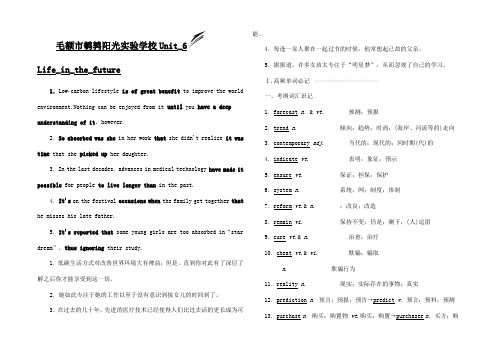
毛额市鹌鹑阳光实验学校Unit_6Life_in_the_future1.Lowcarbon lifestyle is of great benefit to improve the world environment.Nothing can be enjoyed from it until you have a deep understanding of it,however.2.So absorbed was she in her work that she didn't realize it was time that she picked up her daughter.3.In the last decades, advances in medical technology have made it possible for people to live longer than in the past.4.It's on the festival occasions when the family get together that he misses his late father.5.It's reported that some young girls are too absorbed in“star dream”,thus ignoring their study.1.低碳生活方式对改善世界环境大有裨益,但是,直到你对此有了深层了解之后你才能享受到这一切。
2.她如此专注于她的工作以至于没有意识到接女儿的时间到了。
3.在过去的几十年,先进的医疗技术已经使得人们比过去活的更长成为可能。
4.每逢一家人聚在一起过节的时候,他常想起已故的父亲。
5.据报道,许多女孩太专注于“明星梦”,从而忽视了自己的学习。
Ⅰ.高频单词必记一、考纲词汇识记1.forecast n.& vt. 预测;预报2.trend n. 倾向;趋势;时尚;(海岸、河流等的)走向3.contemporary adj. 当代的;现代的;同时期(代)的4.indicate vt. 表明;象征;预示5.ensure vt. 保证;担保;保护6.system n. 系统;网;制度;体制7.reform vt.& n. ;改良;改造8.remain vi. 保持不变;仍是;剩下;(人)逗留9.cure vt.& n. 治愈;治疗10.cheat vt.& vi. 欺骗;骗取n. 欺骗行为11.reality n. 现实;实际存在的事物;真实12.prediction n.预言;预报;预告→predict v.预言;预料;预测13.purchase n.购买;购置物vt.购买;购置→purchaser n.买方;购买者二、高频词汇活用(一)一言辨异14.After the quarrel Susan remained cold and ________,up to now,there is still a certain ________ between her and her father.(distant)答案:distant;distance15.The workers ________ that their ____________ should be met at once.Otherwise they would go on striking.(require)答案:required;requirements(二)用regular及其派生词的适当形式填空16.(1)I am ________ invited to give talks about my time in Nepal.(2)The company is very strict on enforcing health and safety________.(3)He phones us every Sunday at six,________ as clockwork.答案:(1)regularly (2)regulations (3)regularⅡ.重点短语必背1.keep_in_touch_with_... 与……保持联系2.pay_attention_to 注意;留意3.deal_with 处理;安排4.in_store 贮藏着;准备着;就要来到5.as_usual 照常;像往常一样6.be_well_prepared_for 为……做好充分准备7.keep_pany 陪伴某人8.clean_up 打扫干净;整理;获利Ⅲ.经典句型必会1.It is certain that things will change.将来情况肯定会发生变化。
(新人教版)英语八年级上册 Unit 6大单元教学设计

八年级上册Unit 6单元整体教学设计1.单元主题确定本单元的话题是生活目标(Life goals)属于新课标中“人与自我”范畴内“学习与生活”主题群中的“丰富、充实、积极向上的生活”子主题内容和“做人与做事”子主题的内容。
谈论对未来生活的打算,促进其在语言学习中发展思维,在思维发展中学习语言,提升思维逻辑性、批判性和创新性。
通过对未来话题的讨论,让学生初步了解中外学生的择业观,树立自己的健康积极的生活目标,制定相应的学习计划,鼓励其树立为实现人生理想和国家梦想而努力的决心和信心,强化家国情怀的培养。
2.单元内容分析本单元以谈论对未来的打算为功能,紧扣话题的四个对话和两个阅读文本为载体,在具体情景中展开听说读写看的活动,谈论理想的内容和实现理想的举措。
3.单元课时内容Part1: Section A 1a-2d 听说课Part2: Grammar Focus-3c语法课Part3: Section B 1a-1e 听说课Part4: Section B 2a-2e 阅读课Part5: 3a-Self check 写作课4.单元教学目标本单元学习结束时,学生能够①语音:在朗读中正确把握节奏和重音。
②词汇短语句型:正确使用新词汇和短语表达。
③语法:正确使用一般将来时be going to和want to be的结构去谈论对未来的打算。
④能力:提高听说能力;掌握基本的阅读技巧:预测、精读、泛读;结合本单元的语言表达完成基本的写作训练。
第1课时教学设计一、教学内容:Section A 1a-2d二、课型:听说课三、语篇研读What: 谈论未来的职业话题,1a罗列了本单元所学职业词汇,1a-1c按个人兴趣为职业排序、听力练习及对话训练,并引出本单元话题——生活目标,2a-2c的内容集中在打算如何实现理想。
2d是在原来话题基础上增加更为真实的情境——与他人交流未来的职业。
Why: 通过谈论未来的职业,运用一般将来时和相关职业类词汇,形成初步的语言结构认识并理解运用。
Life_in_the_future知识点结构
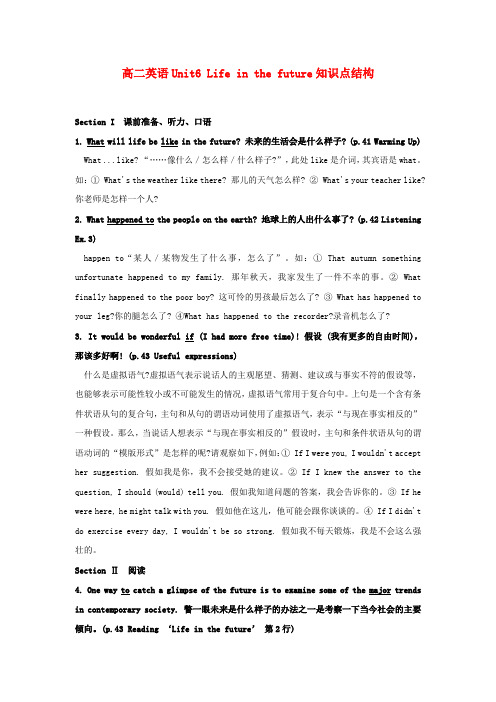
高二英语Unit6 Life in the future知识点结构Section I 课前准备、听力、口语1. What will life be like in the future? 未来的生活会是什么样子? (p.41 Warming Up) What ...like? “……像什么/怎么样/什么样子?”,此处like是介词,其宾语是what。
如:① What's the weather like there? 那儿的天气怎么样? ② What's your teacher like? 你老师是怎样一个人?2. What happened to the people on the earth? 地球上的人出什么事了? (p.42 Listening Ex.3)happen to“某人/某物发生了什么事,怎么了”。
如:① That autumn something unfortunate happened to my family. 那年秋天,我家发生了一件不幸的事。
② What finally happened to the poor boy? 这可怜的男孩最后怎么了? ③ What has happened to your leg?你的腿怎么了? ④What has happened to the recorder?录音机怎么了?3. It would be wonderful if (I had more free time)! 假设 (我有更多的自由时间),那该多好啊! (p.43 Useful expressions)什么是虚拟语气?虚拟语气表示说话人的主观愿望、猜测、建议或与事实不符的假设等,也能够表示可能性较小或不可能发生的情况,虚拟语气常用于复合句中。
上句是一个含有条件状语从句的复合句,主句和从句的谓语动词使用了虚拟语气,表示“与现在事实相反的”一种假设。
那么,当说话人想表示“与现在事实相反的”假设时,主句和条件状语从句的谓语动词的“模版形式”是怎样的呢?请观察如下,例如:① If I were you, I wouldn't accept her suggestion. 假如我是你,我不会接受她的建议。
涛浙学校高中英语第二册上Unit 6 Life in the future 单元练习

烧烛州烟递市涛浙学校Unit 6单元练习Unit 6 Life in the future第一节:单项填空(共15题;每小题1分,满分15分)1. —What would you do to please your boss?—_______. No one can predict his next plan.A. Come onB. It all dependsC. It doesn’t matterD. Go ahead2. The latest _______ in women’s clothes indicate that people now care more about being comfortable.A. tracksB. signsC. directionsD. trends3. _______ matters is _______ people think and talk about over weeks and even months ahead.A. It; whatB. What; thatC. That; howD. What; what4. All the front-seat passengers are _______ by law to wear a seat belt.A. necessaryB. requiredC. neededD. called5. For discussion of how _______ this possible threat, you must read more on the internet.A. dealing withB. doing withC. to deal withD. to do with6. Much _______ should be paid to the ‘group’ effort rather than the ‘self’ effort in the field.A. effort B. attention C. energy D. strength7. He looked at me as if to ask another question, but he _______ until I left angrily.A. remained silentB. remained silentlyC. was remained silentD. was remained silently8. To _______ children’s safety, the builder rounded the edges and constructed it on soft, sandy ground.A. predictB. forecastC. ensureD. reform9. He has made another wonderful discovery, _______ great importance to science.A. which I think is ofB. which I think it is ofC. which I think isD. I think which is of10. —Do you mean the medical team have cheated you _______ much money?—Yes. I have spent so much money, but they couldn’t even cure me _______ my cold.A. at; ofB. with; aboutC. of; ofD. at; with11. You see, the arrow on the wall _______ the way to the parking lot.A. announcesB. indicatesC. declaresD. says12. Nobody knows what the future may hold _______.A. in storeB. in useC. in touchD. in order13. Having known for many years, we _______ each other by discussing special events in our lives through emails.A. catch up withB. keep up withC. get in touch withD. keep in touch with14. —What’s the weather forecast _______ tomorrow?—Sorry. I don’t know.A. for B. to C. with D. of15. The statue of Guanying, a Buddhist fairy, can be seen from a _______ of 60 miles.A. lengthB. distanceC. wayD. space第二节完形填空 (共20小题;每小题1分,满分20分)Ted had not seen his old friend Sam since they were at school together. Then Ted saw Sam at a business meeting which 16 men were at a big 17 , and he went over and spoke to him. “Hi, Sam!” Ted said 18 . “How are you?” “I’m very well, thank you,” Sam answered. They sat down 19 and began to talk. “I have 20 a wife and two children now,” Sam began. “Well,” Ted answered, “I have married too and had three children.”After half an hour, Sam said, “I must go and buy myself a tooth brush now. I 21 mine at home. Let’s have dinner evening and then we can talk 22 .” “All right,” Ted said.They 23 in the restaurant of the hotel, and they both began to talk about their 24 . Ted said, “I think it was very 25 for people. When I was a young man we did things ourselves, we didn’t just watch other people. In the evenings, we sang songs or played music or cards with each other, 26 we read the newspaper or found ourselves something to do.” Sam 27 . “Yes,” he said. “That’s true, and perhaps once a week, or once a month, we went into the town specially to see a film at the cinema, and maybe to buy an ice-cream.” “And now,” Ted 28 . “My children watch 29 films on television almost every 30 , and they don’t do the work that their teachers give them. 31 will they do with themselves when they 32 school?” “Yes, it’s very bad, isn’t it?” Sam said. “ 33 what can we do about it?” “Well,” Ted answered. “I have 34 myself one thing: I’m going to sell our television set 35 the football season finishes at the end of this month.”16. A. most B. both C. all D. other17. A. restaurant B. market C. hotel D. theatre18. A. loudly B. angrily C. quickly D. happily19. A. side by side B. step by step C. now and then D. over and over20. A. got B. married C. wanted D. made21. A forgot B. left C. lost D. put22. A. a lot B. much C. more D. enough23. A. saw B. talked C. went D. met24. A. television B. films C. past D. future25. A. good B. bad C. useful D. harmful26. A. and B. but C. or D. for27. A. murmured B. answered C. announced D. nodded28. A. continued B. stopped C. wondered D. thought29. A. wonderful B. silly C. interesting D. fearful30. A. week B. month C. evening D. minute31. A. Why B. How C. Where D. What32. A. leave B. go to C. continue D. study33. A. Therefore B. But C. Again D. Or34. A. offered B. supplied C. promised D. answered35. A. as well as B. as far as C. as long as D. as soon as第三部分阅读理解 (共20小题;每小题2分,满分40分)ALillian Hanson, a college student, expects to graduate in about two years. What makes Mrs. Hanson different from her classmates is her age—73 years old. She has been studying at college, a few courses at a time, for 27 years.When Lillian Hanson graduated from high school, she went to the bank to borrow money for further education. The banker gave her no encouragement. He did not think that a country girl should borrow money to go to college. He thought she should be at home doing work in the house or around the farm. So Lillian Hanson went home and raised a family of nine children instead of going to college.Mrs. Hanson never forgot her dream of getting a higher education. When her children grew up, she tried again.She finds it is the hardest part of going back to school at her age to be sitting in class for long periods of time. Because she is not as quick as she used to be, Mrs. Hanson often gets up and walks around between classes to keep from getting stiff (不灵活的). At the beginning of a course in using the computer, the other students all stood up to give her a warm welcome when she introduced herself and explained why she was there and what her aims were.36. Which of the following is the difference between Mrs. Hanson and her classmates?A. She was eager to receive a higher education.B. She was a 73-year-old woman.C. She came from the country.D. She worked hard at her lessons.37. Why couldn’t Mrs. Hanson continue to study in the college soon after she graduated from highschool?A. Because she was not rich enough.B. Because she wanted to teach herself.C. Because she had got married.D. Because she was a country girl.38. Which is the best title for the passage?A. A Strange Woman.B. A Great Mother.C. An Extraordinary Student.D. A Cruel Banker.39. The writer wrote this passage in order to show us that _________.A. it is never too old to learnB. Lillian Hanson was a kind-hearted motherC. Lillian Hanson paid more attention to the importance of educationD. a friend in need is a friend indeedBHow many coins have you got in your pocket right now? Three? Two? Or one? With a phone card you can make up to 200 calls without any change at all.1. What do you do with it?Go to a telephone box marked “Card Phone”. Put in your card, make your call and when you’ve finished, a screen tells you how much is left on your card.It costs no extra for the cards, and the calls cost 10p per unit, the same as any other payphone call.You can buy them in units of 10, 20, 40, 100 or 200.2. Now appearing in a shop near youNear each Card Phone place you’ll find a shop where you can buy one. They’re at bus, train and city tube (地铁) stations.At many universities, hospitals and clubs, restaurants and gas stations on the highway and shopping centers.At airports and seaports.3. No more broken payphonesMost broken payphones are like that because they’ve been vandalized (破坏). There are no coins in Card Phone to excite thieves’ interest in it. So you’re not probably to find a vandalized one.Get a phone card yourself and try it out. Or get a bigger wallet.40. The passage is most probably _______.A. a warningB. a noteC. an advertisementD.an announcement41. Which section of the passage do you think is about why Card Phones are good?A. Part 1.B. Part 2.C. Part 3.D. None.42. Choose the right order of the steps to use a card phone.a. Put in your phone card.b. Look at the screen to find out how many calls you can still make.c. Go to the telephone box marked “Card Phone”.d. Make your call.A. a, b, c, dB. c, a, d, bC. a, d, c, bD. c, d, a, b43. According to the information you get from the passage, how much does a card with 40 units cost?A. 4 pounds.B. 40 pounds.C. 400 pounds. D100 pounds.44. The last sentence “Or get a bigger wallet” means _________.A. phone cards are cheapB. you cannot use all payphonesC. thieves will not break card phonesD. or people have to carry much moneyCThis March is a busy month in Shanghai. There’s a lot to do. Here are the highlights.Live Music—Late Night JazzEnjoy real American jazz from Herbie Davis, the famous trumpet player. He’s coming with his new 7-piece band, Herbie’s Heroes. Herbie is known to play well into the early hours, so don’t expect to get much sleep. This is Herbie’s third visit to Shanghai. The first two were sold out, so get your tickets quickly.■Scottish dancingTake your partners and get ready to dance till you drop. Scottish dancing is fun and easy to learn. Instructors will demonstrate the dances. The live band, Gordon Stroppie and the Weefrees, are also excellent.■Exhibitions—Shanghai MuseumThere are 120,000 pieces on show here. You can see the whole of Chinese history under one roof. It’s always interesting to visit, but doubly so at the moment with the Egyptian Tombs exh ibition. There are lots of mummies and more gold than you’ve ever seen before. Let us know if you see a mummy move!■Dining—Sushi chef in townSushi is getting really big in Shanghai. In Japan, it’s become an art form. The most famous Sushi “artist” is Yuki Kamura. She’s also one of the new female chefs in Japan. She’ll be at Sushi Scene all of this month.■For a full listing of events, see our website.45. Which of the following is TRUE according to the advertisements?A. The performance given by th e American jazz band won’t last long.B. Scottish dancing is so interesting and easy that it never tires you out.C. It is more interesting to visit Shanghai Museum for the exhibits from Egypt.D. Sushi is not popular in Shanghai as it is a kind of Japanese traditional food.46. Suppose you are going to attend an activity at 8:00 p.m. on Saturday, which one can you choose?A. Dining—Sushi chef in town.B. Exhibition—Shanghai Museum.C. Scottish dancing.D. Live Music—Late Night Jazz.47. From the passage we may learn that Kamura is ______.A. a waitressB. an instructorC. an artistD. a cookDWhen you buy a T-shirt, or a fur coat in a store, it often carries a label telling who made it or from which store it was bought. Indeed, some labels show the dress is famous and it is very expensive, so buyers secretly wish they might be carried forever. On the other hand, buyers who deal with the cheapest products would be pleased to do away with the labels entirely.However, there is another label more important than the one showing from which store the dress was bought. When a person buys a fur coat or a jacket from a store, a label telling what the product is made of should be carried to it.This label is required by law. Besides telling what the product on show is made of, the label should be in clear English and be where one can find it easily. The information on the label must be the truth. The reason for this label is that most buyer s today aren’t expert enough to know exactly what kind of fur or material they are buying. The buyer must believe in the store that sells the products or in what the labels say.In the USA, there are also care instructions on such a label. The Care Labeling Rule requires clothing manufacturers and importers to provide at least one satisfactory method of care necessary for the ordinary use of the garment. The label must also provide warnings against the use of any method that would do harm to products.48. B y saying “the label should be in clear English”, the writer means that ______.A. the label should only be written in EnglishB. the label should be seen clearly by buyersC. the product should be made in EnglishD. the label should be stated clearly in English49. We can infer from the first paragraph that _____.A. cheap products do not need labels, for buyers don’t like themB. expensive products are encouraged to be carried foreverC. labels may show the value of the productsD. labels are important because they can show where the products are made or sold50. Which of the following is TRUE?A. A T-shirt seldom carries a label.B. A fur coat with a high price often carries a false label.C. A label only says what material the product is made of.D. Not all buyers know the materials they are buying.51. This passage is mainly about how to ______.A. make furs and clothesB. protect buyers with lawC. protect buyers through labelsD. write labelsEBELGIUM’S Justine Henin Hardenne will not be defending her Australian Open title this month. She withdrew from the year’s first major tennis tournament(锦标赛) with a knee injury.The former world No.1 missed most of 2004 with a virus. But she had arrived in Australia with the intention of making her competitive comeback at the Sydney International ahead of the Australian Open.The Australian Open will start in Melbourne on January 17. But Henin Hardenne told tournament director Paul McNamee on Saturday that she would not be attending the Australian Open, leaving the event without last year’s two women’s finalists. This followed Belgian Kim Clijsters’ official withdrawal last Friday because of a wrist injury.McNamee said Henin Hardenne was due to fly to Europe on Saturday, after injuring her knee while practicing in Florida last month.The 22-year-old girl was limited to just nine tournaments in 2004 after being struck down with an illness that used up her energy and left her feeling weak.After making a bright start to the year with victories in Sydney and Dubai, Henin Hardenne was sidelined(退出比赛) for seven weeks with the virus.The triple grand slam champion(大满贯得主)attempted a comeback at the French Open. But she had to stay in bed again for almost three months after being injured in the second round.She made a temporary(暂时的) comeback to win Olympic gold in Athens last August, but was hit by the illness once again and withdrew from the WTA (Women’s Tennis Association) circuit.Japan’s Ai Sugiyama was a chief beneficiary (a person who gets benefit) of Henin Hardenne’s withdrawal, climbing to the eighth seed for the Sydney International.The WTA and ATP (Association of Tennis Professionals) tournament gets underway Sunday at Sydney’s Olympic tennis center.52. What is the most probable meaning of the underlined word “withdrew” (in paragraph 1)?A. Joined in.B. Gave up.C. Fought against.D. Gained.53. Which person has benefited most from Henin’s withdr awal from the Australian Open?A. Kim Clijsters.B. Justine.C. Ai Sugiyama.D. Paul McNamee.54. Henin Hardenne had to be confined to bed for almost three months _______.A. after the US OpenB. after the French OpenC. after the Olympic GamesD. after the Australian Open55. How many tournaments could she take part in at most in 2004?A. 8.B. 9.C. 10.D. 11.第四节短文改错(共10小题;每小题1分,满分10分)I was used to be a loser and everything I did always 56. ___________went wrong. During that time, I was extreme 57. ___________disappointed with myself. I couldn’t do everything 58. ___________well no matter easy it was. In the meantime, an 59. ___________old friend of mine encourages me to stand up again 60. ___________and told me that he was still young enough to try 61. ___________more time. I took his advice and made a great 62. ___________effort to achieve something. Then I found I could do 63. ___________things much more better. Now I no longer think I am 64. ___________a person who often loses but I can do things well. 65. ___________第五节:书面表达(满分25分)请根据下面的内容写一篇100词左右的日记。
Unit 6 Life in the future
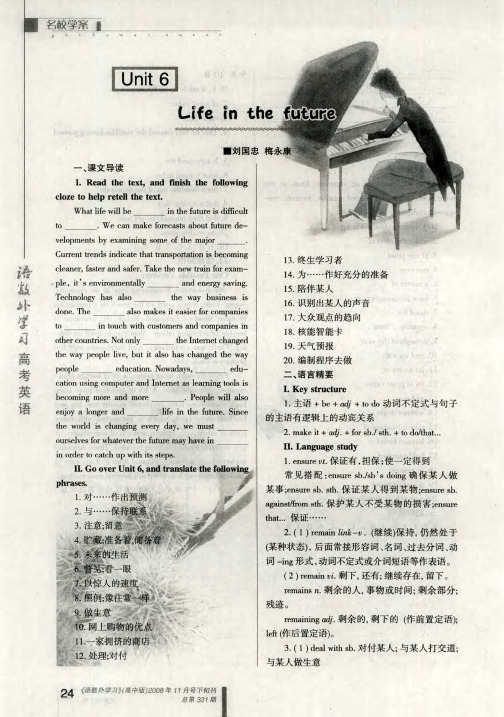
s
.
15
.
陪伴 某 人
识 别 出某 人 的声 音
Te
c
h n o lo g y
.
ha
— — — — —
s
a
ls
—
o
. . . . . . . . . . . . . . . . . . . . . . . . . . . . . . . . . — —
the
w a
y
bu s in
r
c o m
e s s
teds n e h ia c 在远 处, 方 的;ke b a a ia c t 远 eps.t s ne d t 与 某 人保 持 一 定距 离 ,不 是 很 亲 密; epoe S ke n ’ ds nerm对 ……比较 冷淡,离……较远; i i ia c o t f wt n h
l
( d a wt . 2) el i s 处理; 付; ht h 应 涉及 ; 论述
注: 辨析 da wt el i h与 d w 。 o .
d awt 中 da 是 不 及 物 动 词 , 能 在 d a e i l h e l 只 e l
w 山后接宾 语 。故 常与 hw连用 : o t 中的 d i o d h i w 0
’
S
d o in g
确保某 人 做
r e s
b
.
th
.
e 保证 某 人 得 到某 物; n s u
b
r e
.
i ga
n s
t/ o fr
m
s
h t
…
.
e 保 护 某 人 不 受 某 物 的损 害 ; n s u
人教版高二英语unit 6 reading life in the future
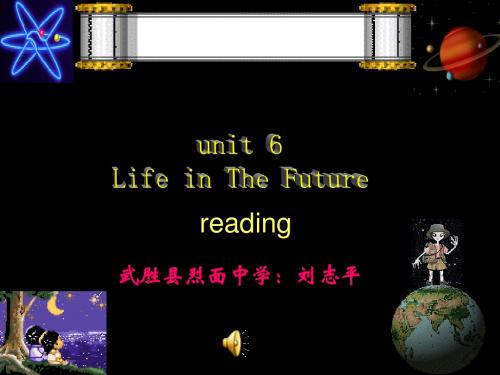
What makes it possible for people to enjoy a longer life?
1. People will pay attention to …. 2. People are careful about…. 3. Advances in medical science allow us…. 4. New discoveries in …and … may lead to….
E-commerce;mall; smart cards. Healthy diet ; exercising regularly; advances in medical science.
Enjoy a longer and healthier life ; remain active
Education and knowledge
On-line shopping
What can people do in the malls in the future?
Shopping has become a form of entertainment ___________.
How will people pay for their purchases?
smart cards instead of cash.
Fill in the form
Fields What will be used?
fuels and engines
Results
Cleaner, faster and safer. Convenient, fun.
Transportation New technology ;new Business Health and medicine Education and knowledge
高二英语教案:Unit 6 Life in the future教案
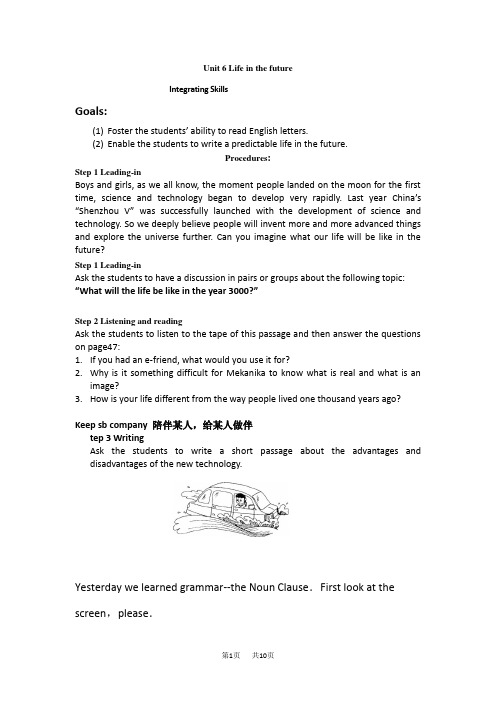
Unit 6 Life in the futureIntegrating SkillsGoals:(1)Foster the students’ ability to read English letters.(2)Enable the students to write a predictable life in the future.Procedures:Step 1 Leading-inBoys and girls, as we all know, the moment people landed on the moon for the first time, science and technology began to develop very rapidly. Last year China’s “Shenzhou V” was successfully launched with the development of science and technology. So we deeply believe people will invent more and more advanced things and explore the universe further. Can you imagine what our life will be like in the future?Step 1 Leading-inAsk the students to have a discussion in pairs or groups about the following topic:“What will the life be like in the year 3000?”Step 2 Listening and readingAsk the students to listen to the tape of this passage and then answer the questions on page47:1.If you had an e-friend, what would you use it for?2.Why is it something difficult for Mekanika to know what is real and what is animage?3.How is your life different from the way people lived one thousand years ago? Keep sb company 陪伴某人,给某人做伴tep 3 WritingAsk the students to write a short passage about the advantages and disadvantages of the new technology.Yesterday we learned grammar--the Noun Clause.First look at the screen,please.(Show the following on the screen.)1.What life will be 1ike in the future is the topic for today’s class discussion.2.Can you imagine what life will be like in the future?3.One of the questions that few people can give answer to is what life will belike in the future.T:Study the sentences and find out what kind of Noun Clause the underlined part in each sentence is.(The students prepare for a couple of minutes.Then the teacher may ask some student to say their answers.)Suggested answers:1.Subject Clause2.Object Clause3.Predicative ClauseT:Good.But generally speaking,it is hard for you to choose connectiyes in- troducing the Noun Clause.Only when you know the functions of the connectives can you use the Noun Clause as the Subject,Object,Predi-cative and Appositive freely.Now let’s do some exercises to consolidate what you have learnt.(Show the following on the screen.)Fill in the blanks with suitable connec-tives.1._______composition is the best is known to us a11.2.He wondered________he was not al-lowed to go out alone.3.______is to take Li Ming’s place is being dis cussed.4.I got very angry with______he said.5.My idea is_________we should ger more people to finish the work.6.I wonder_________it is true or not.7.The problem is___________we could help smokers kick their habit.8.The news__________we had won in the match excited all.9.We have no idea_________she was born.10.That’s________we decided to put the meeting off.Suggested answers:1.Whose 2.why 3.Who 4.what 5.that 6.whether 7.how 8.that 9.when/where lO.whyT:In this unit,we’ve also learned some u seful expressions.Do you remember them?Now let’s do an exercise to re-vise them.please look at the screen.(Show the following on the screen.)Complete the sentences,using the ex-pressions learnt in this unit.1._______his work has been good,but this essay is terrible.2.You should________your friend by let-ter.3.Please_________what I am saying.4.He always keeps several baskets of apples________.5.The misprint________great confusion.6.He_______her before she vanished(消失)into the crowd.7.His dream of being a famous singer________at last.Suggested answers:1.In general 2.keep in touch with3.pay attention to 4.in store5.led to 6.caught a glimpse of7.came trueT:In this unit,we’ve also read a passage about life in the fu ture.Now pleasethink out some words you can use to describe life in the future.(After a while,ask some students to say out the words.)Step Ⅲ Reading and WritingT:OK.As we know,people’s life hasbeen changing.It’s getting better and better.What do you think life in the 3lstcentury will be like?will it be the same as that today?Ss:No.We think life in the 3lst century will be very different from that in this century.We’ll live more easily than today.We’ll have a machine do what we want them to.The only thing we need to do is to press the buttons on the computer.T:OK.Thank you.Today we’re going to read a letter about the waypeople willlive more than one thousand years lat-er and we can know what the life in the 3lst century will be like.First let me explain some phrases to you:keep sb.Company,a bit and clear up.(Show the following on the screen.)1.keep sb.company:remain with sb.so that he is not alone.e.g.He stayed at home to keep his wife company.I’ll stay here and keep you company.2.a bit:rathere.g.He is feeling a bit tired.The book costs a bit much.3.clear up:put in order/make sth.Tidye.g.Clear up your desk before you leave the classroom.Would you please clear up the cup-board?(Bb:keep sb.Company,a bit,clear up)T:Now open your books at Page 47.Look at Reading and Writing.Here is a letter from Mekanika.Now you’re given four minutes to read it.Then answer some questions under the letter.(The students begin to read.After a while.teacher checks their compre-hension.)T:Who’d like to tell me what you would use an e-friend for,if you had one?(One students stands up.)S:Let me try.If I had an e-friend.I would let him help me with what I couldn't do,keep me company,talk with me and help me with my homework.(Another student begins to give the answer.)S:I think I would have the e-friend help me take notes when I was listening to a lecture and play chess with me.Fur-thermor,I would let my e-friend help me if I was in trouble.T:Thank you.Now the second question:Why is it sometimes difficult for Mek-anika to know what is real and what is an image?Any volunteer?S:Because the world and people are imi-tated so well that we can see them,hear them,touch them,talk to them and feel them.They are just like the real world and real people.T:OK.The last question:How is our 1ife different from the way people lived one thousand years ago?S:Now life is much easier and more con-venient than in the past.We can keep in touch with each other by cellphone or by computer insteadof by writing letters.S:We can travel by car instead of on foot.We can buy things on the Inter-net.We can also get the latest infor-mation by surfing the Internet.…Step Ⅳ Listening and Reading AloudT:Now let’s listen to the tape.When I play it for the first time,just listen carefully.When I play it for the second time,please listen and repeat.Then read the passage aloud.Pay attention to your intonation.Are you clear?S:Yes.(Play the tape for the students to lis-ten.Then when the students read the passage.the teacher goes among them and corrects their mistakes in pronun-ciation,intonation and stress.)Step V WritingT:We have known what the life will be in the year 3044.Imagine that you have come back from a trip to the future.You visited the year 4367 and you saw a wonderful invention called a Mogray.Now work with your partner and decide what a Mogray is,what it looks like and what it is used for.(Teacher asks the students to discuss the questions.And then collect theiranswers.After that,the teacher says the following.)T:Now you know what it is like.Please write a paragraph about what a Mogray is.Before writing,you have to complete the outline on the screen.(Show the following on the screen.)(Teacher asks the students to write the outline in their exercise books.Students may have various answers.)T:OK.You have finished your outline.Please use it to write your paragraph.(Teacher may let the students hand them in after class,if time is limited.)One possible version:Life in the year 4367 is quite differ-ent from life in the 21st century.We willstill do many things we do today,but we do them differently.For example,we canuse a Mogary to help us.A Mogary is an intelligent robot,which looks exactly like a human being.It can be used in many fields.such as at home,in the factory or in nature.The Mogray can be easily and con-veniently used at home.If you want to travel,you can turn it into all kinds of transport that you like,such as a plane,a car or a train,which use the solar energy without pollution.When it is too cold ortoo hot,the head of the Mogray can be used as an air—conditioner,which can keep a proper temperature.There are all kinds of recipes in its head.It can cook all kinds of healthy and delicious food for yoi if you press the buttons on it.When you are bored,it can read some books for you,which are stored in its brain.It can also play chess with you or communicate with you.It has thoughts similar to yours,Your life will be rich and colorful with a Mogray companying you.It can be used in many fields.In a word,the earth will become even more beautiful with the help of it.Step Ⅵ Summary and HomeworkT:Today,we’ve learned a passage about the life in the year 3044.At the same time,we wrote a passage about the life in the year 4367.What’s more,we’ve revised the Noun Clause and the useful expressions in this unit.such as in general,keep in touch with,in store…(Write them on the blackboard.After class,you should master them further by revising what we’ve learnt in this unit.Don’t forget to prepare for the next unit.That’s all for today.Class is over.)Step Ⅶ The Design of the Writing on the BlackboardUnit 6 Life in the futureThe Fourth PeriodUseful expressions:keep sb.company a bit clear up in general keep in touch with in store pay attention to lead to catch a glimpse of come true。
高二英语上单词Unit6 Life in the future
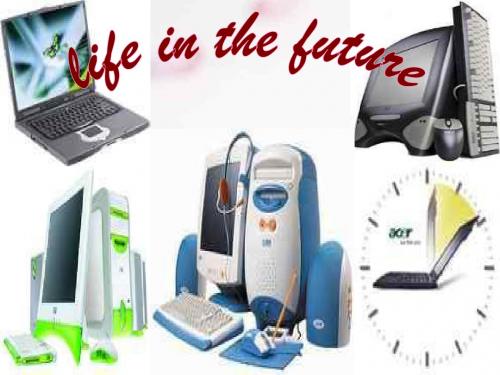
Step 2: Pre – Reading
1. How will people shop in the future? 3 Paragraph________ 2. How will people travel in the future? 2 Paragraph________ 3. What will schools be like in the future? 5 Paragraph________ 4. What will the future be like in general? 1 and 6 Paragraphs________
in store;keep in touch with; lead to;catch a glimpse of In general 1__________ ,boys like playing football more than girls. caught a glimpse of 2 I________________a high building from the window of a train. kept in touch with 3 Mr. Wang _____________ his old friends by mobilephone. leads to 4 Hard work ________success. in store 5 I have some good news ______ for you.
• • • • • • • • • •
reform the way do business on the Internet online shopping get / keep in touch with a form of search…for.. a crowded store combine …with… pay for smart cards remain active a healthy diet exercise regularly deal with More importantly, distance education lifelong learners be well-prepared for have…in store
- 1、下载文档前请自行甄别文档内容的完整性,平台不提供额外的编辑、内容补充、找答案等附加服务。
- 2、"仅部分预览"的文档,不可在线预览部分如存在完整性等问题,可反馈申请退款(可完整预览的文档不适用该条件!)。
- 3、如文档侵犯您的权益,请联系客服反馈,我们会尽快为您处理(人工客服工作时间:9:00-18:30)。
remain: (1) vi. 剩下;余留下来 The town was destroyed in the war, but the library remained. 城市在战争中毁了,但是图书馆还在。
There remained just a little money; what was to be done? 只剩一点钱了,怎么办呢?
has been developed.
土改后生产力发展了。 reforms in the school system 教育制度改革(之实例)
crowded: adj. 拥挤的;塞满的 The tent was now a bit crowded. 帐篷这时有些挤了。
crowded cities/trains/buses The bookshelves were crowded with books. crowd: v. 涌向,拥挤;n. 人群,一群人 They managed to crowd into a train. a crowd
除了约翰,我们都去看戏了,他留在家里
(3) vi. 保持;继续是
I asked her a question but she remained silent. 我问了她一个问题,但她仍保持沉默。 他的法语水平仍然很差。
His knowledge of French remained very weak.
well-prepared well-balanced well-behaved well-meant well-thought-of well-spoken
做好准备的 有各种营养的 举止端庄的 好意的 受人崇敬的 说话得体的
well-intentioned
善意的
cheat: (1) n.[C] 骗子 (2) v. 欺骗;作弊 They cheated her into marrying him. 他们骗她与他结婚。 He is cheating at cards. 他打牌舞弊。 他考试时作弊给我们抓住了。 We caught him cheating in/on the examination.
他是该运动实际上的领袖。 * (2) adj. 【光学】虚像的
a virtual image
虚像
define (vt.): n. definition (1) vt. 给 <字词、概念等> 下定义, 释义 A dictionary defines words. We may define a square as a rectangle with four equal sides. 我们可以将正方形定义为四边相等的 长方形。 (2) 确定,规定 Please listen while I define your duties. define one's position 表明自己的立场
forecast: (1) v. 预言,预测 John forecasts crowded roads at the weekend. 约翰预言周末时路上交通很拥挤。
(2) n. 预测,预报
I listen to the weather forecast on the radio
every morning.
cure: (1) n.[U] 治好;痊愈; [C] 药方 His cure took six weeks. 治好他的病花了六个星期。 Sports provide a cure for the disease. 运动能治好这种病。
(2) v. 治愈
be cured with a …medicine 以…药治愈 The doctor cured the pain in my back. This medicine should cure you of your cold.
He soon consumed his fortune. 他很快耗尽他的财产。 consumer: n. 消费者,用户,客户 Consumer goods consumers’ interests consumer research 消费品 消费者利益 消费者调查
reform: (1) vt. 改善;改革 We are going to reform this law. 我们即将改革这个法律。 (2) vi. 改过自新
indicate: (1) vt. 指示;指出 (point to, point out) He indicated the door with his finger. 他用手指头指了指门。 图上的箭头指示事故发生的地点。 The arrow on the map indicates where the accident happened.
每天早晨我收听气象报广播。
The weather forecast says there will be rain.
天气预报说要下雨。
glimpse: (1)vt. 看一下;瞥见
-
(2) n. 一瞥;短短一看
get/catch a glimpse of 瞥见,望见一眼 We caught a glimpse of a river as the
programme/program: n./v. (1) 计划安排 The central heating system is programmed to start working at 6 o’clock each morning. (2) 编制程序,进行程序设计 The computer is programmed to accept data (资料,数据) in any or all of these media.
The agreement ensured a steady supply
of oil. 该协定保证了石油的稳定供给。 They ensured that he would obtain the prize. 他们保证他会获奖。
(2) vt. 向<人>保证; [向人]保证
A fixed income has been ensured (to) her. 她得到保证会有固定的收入。 我不能担保你获得一个好的职位。 I cannot ensure you a good post.
regular heartbeats
regular hours
有规律的心跳
规律的生活, 定时作息
regular verbs
规则动词
deal with: (1) 处理 How will you deal with this matter? 这件事你将如何处理?
(2) 对付,对待 (treat)
I don't know how to deal with these bad children. 我不知道如何对待这些坏孩子。
The boy promised to reform if given
another chance.
那个男孩答应如果给他机会,他将改过
自新。
(3) n. 改善;改进 Our society needs reform. 我们的社会正需要改革。 Since the land reform, the productive force
(3) vt. 保护<人> [避免…] ,使…安全
ensure oneself from risk(s) 保护自己避免危险 [免遭不测]
consume: vt. 用尽;吃掉;耗费掉
He consumed much time and energy in
writing this book.
他写这本书消耗了很多时间和精力。
imitate:
(1) v. 模仿;仿效
A parrot imitates the human voice. 鹦鹉模仿人说话的声音。 (2) v. 仿造(制) The workers imitate a diamond with crystal. 工人们用水晶仿造钻石。
virtual: (1) adj. (无比较级、最高级) 实质(际)上 It was a virtual promise. 那是实质上的承诺。 He was the virtual leader of the movement.
(2) vt. 表明;暗示;象征 A high fever usually indicates severe
illness.
高烧通常表明生了重病。 Snow indicates the coming of winter.
雪象征着冬天的来到。
ensure (insure):
(1) vt. 保证 <成功等> ; 确保<地位等>
The road trends to the north. 那条路通向北方。 Prices are trending upwards.
contemporary: (1) adj. (无比较级、最高级)<人、作品等> 同时代的, 当代的 Elizabethan plays are often presented in contemporary costume. 拜伦和渥兹华斯是同时代的人。 Byron and Wordsworth were contemporary. (2) adj. 当今的, 现代的 contemporary literature [writers/art] 现代文学 [作家/艺术]
in store: 存储备用,准备着
We must keep our strength in store for the big race.
我们得贮存一些供明年使用。
We must keep some of these in store for next year.
require: (1) vt. 需要;要求 The room requires a general cleaning. 这计划需要仔细考虑。 The plan requires careful thought. (2) vt. 要求 All students are required to take this examination. He required that we (should) work all night. 他要求我们干通宵。 他们要求我出场。 They required me to appear.
